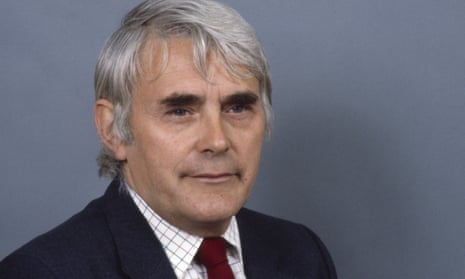Norman Godman, who has died aged 80, was an able and articulate Labour MP who spent most of his 18 years in the House of Commons facing the hard struggles of parliamentary opposition and fighting against industrial decline in his Greenock and Port Glasgow constituency.
His maiden speech in 1983 was devoted largely to the case for retaining the shipbuilding industry on the lower Clyde. Three yards were part of British Shipbuilders, soon to be privatised, and formed the economic backbone of his constituency. Much of his time in parliament was spent dealing with subsequent closures and also the decline of the sugar refining industry, which had been another major employer. Godman was a straight-talking, principled individual who was not afraid to take on a fight. With a large Catholic presence in his constituency and local party, abortion was a running issue for much of his tenure. He made clear that he would, whenever the issue arose, support a woman’s right to choose. He was also an early parliamentary advocate of equalising the age of consent.
Godman’s House of Commons contributions were invariably thoughtful, courteous and well researched. He served under Neil Kinnock as a frontbench spokesman on agriculture and fisheries, and his background gave him an interest in promoting educational opportunity, particularly for those who could benefit from a second chance. Defence was another interest, and he was a lifelong member of the Campaign for Nuclear Disarmament.
Though he represented a Scottish seat, Godman was from a Hull fishing family and retained an interest in the industry, as well as the conditions of those who worked in it. He was one of eight children of Wilfred Godman, a trawlerman, and Isabella (nee Craig), a “fishergirl” who was one of the host of women who gutted the daily catch in the Hull docks and whose own mother had “followed the herring” from Aberdeen to Hull.
Norman attended Westbourne Street boys’ school and worked first as a shipwright in a local yard. After national service in the Royal Military Police in the late 1950s, he went through night school to gain entry to Hull University, where he gained a degree in sociology and trade union studies.
His move to Scotland was through a teaching appointment in the department of business organisation at Heriot-Watt University, where he took a PhD and continued to be immersed in the politics of the fishing industry. A paper he wrote in 1980 with John Godfrey of Edinburgh University was a model of clarity on a complex subject and set out proposals for conservation measures and “coastal state control of fishing grounds” which have remained relevant to the present day.
The Transport and General Workers Union, the paper noted, organised “virtually 100%” of Aberdeen trawlermen, while the rest of the Scottish fishing industry was almost entirely non-unionised. This led the TGWU to promote Godman’s candidacy in the highly marginal Aberdeen South constituency in the 1979 general election, but he lost by 772 votes to the sitting Conservative, Iain Sproat.
Again with TGWU backing, Godman was selected to contest Greenock and Port Glasgow in 1983. Normally this was safe Labour territory, but the long-serving MP, Dickson Mabon, had defected to the SDP and there was already a strong Liberal base in the constituency. Norman’s majority in this catastrophic election for Labour was 4,625, but it soared thereafter as he built an excellent reputation as a constituency MP. He won the seat by majorities of more than 13,000 in 1987, 1992 and 1997, by which time it had been rechristened Greenock and Inverclyde.
When he decided to stand down before the 2001 election, Godman’s constituency party chose a Catholic priest, David Cairns, to succeed him. This drew attention to a parliamentary anomaly – that under 200-year-old legislation priests of the Catholic faith were debarred from sitting in the House of Commons. Although Godman said his own preference would have been for a woman to succeed him, he played a prominent part in promoting legislation which eventually corrected this anomaly in time for Cairns to take his seat.
Godman continued to take a close interest in the fishing industry, mainly through his TGWU involvement. His last parliamentary speech was on the subject of the common fisheries policy, attacking the “scandal” of 40% of caught fish being discarded, maintaining that peripheral communities close to fishing grounds were “severely discriminated against” by the CFP, and calling for a regional system of fisheries management.
In 1981 he married Trish Leonard, who in 1999 was elected to the Scottish parliament as Labour MSP for West Renfrewshire and became deputy presiding officer at Holyrood from 2003 until 2011. As well as supporting Trish in her work, he developed a new role as an enthusiastic allotment holder, walked a great deal, and enjoyed the convivial life of Glasgow’s west end.
He is survived by Trish and her three sons from a previous marriage.

Comments (…)
Sign in or create your Guardian account to join the discussion